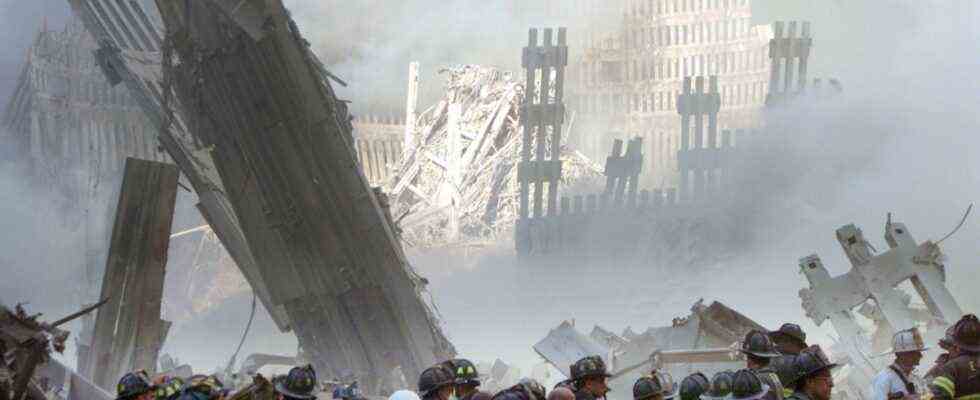When terror hit the USA on September 11, 2001, when the World Trade Center burned in New York and the Pentagon in Virginia, when almost 3,000 people died in a few hours, it was clear that America had changed. After this day of terror, nothing will be the same again, it said. And that sounded plausible at the time. How could a country that suffered such a wound ever return to normal?
Today, two decades later, Americans are no longer living in the state of emergency into which they were plunged on that bright autumn day. The pain, the anger and the sadness, the shock that there are people in the world who want to do this to the US have subsided. More than a third of the people in the United States are under the age of 25 and have no or only a vague personal memory of the terrorism. But the new normal is different from the old normal. 9/11 has carved itself into Americans’ daily lives in many ways, whether they saw the day for themselves or not. Indeed, the land and life are no longer the same as they were on September 10, 2001.
Over the Brooklyn Bridge, the second plane can be seen exploding in the World Trade Center.
(Photo: Sara K. Schwittek / Reuters)
Some of these changes are rather mundane. For example, in the United States, passengers still have to take off their shoes when going through security. There could be weapons or explosives in the soles. In museums, bags are still checked for suspicious things at the entrance. And everyone who wears a uniform is a “hero”, be it a police officer, firefighter or soldier. As if he were just because of the color of a shirt and some patches one of those real heroes who ran into the burning towers in Manhattan on September 11, 2001 to save people. And then buried by the rubble.
National security as a justification for questionable measures
Other changes are far less harmless. 9/11 has shown the US its vulnerability, and the country has responded with a massive armament of the entire state security apparatus, from the military to the secret services to local police authorities. The fact that even police departments in the province have armored vehicles, a military arsenal and a special task force and are accordingly martial is a direct consequence of 9/11.
A new department has been established in Washington, the Department of Homeland Security, which is responsible for border protection as well as for disaster relief and the coast guard. Counter-terrorism and national security have become a cloak under which thousands of billions of dollars have been spent and bureaucracies inflated without any control over whether it really makes the US safer.
Counter-terrorism and national security also became buzzwords to justify political decisions and actions that, until September 11, 2001, would have been considered unacceptable, perhaps even illegal. It started right after the attacks, when the FBI arrested hundreds of innocent Muslim citizens as allegedly “essential witnesses”. It was little more than an anti-Islamic fishing expedition; none of these people had anything to do with the attacks. In truth, the security authorities had overlooked the clues that had been given for the impending attack.
The security craze later led to widespread surveillance by the National Security Agency. And it led down to the torture chambers that the CIA set up in Guantanamo and in other countries. America, the land of freedom and civil rights, lost part of its soul during these years.
Some of these undesirable developments have since been corrected. Others can no longer be removed from the world. For example, the general suspicion that Muslims in the USA came under at that time still wafts in the background and can be mobilized at any time. Donald Trump did this successfully in his 2016 election campaign – among other things with the long refuted lie that on September 11, 2001, “thousands upon thousands” of Arab citizens in New Jersey cheered the collapse of the towers in Manhattan. The alleged need to be able to defend oneself against Islamist terrorists also motivated many militia members in the years after 9/11. In the meantime, “socialists” and “the Antifa” have replaced the Muslims as the enemy in these circles.
Wars out of fear and vindictiveness, with devastating consequences
The most tragic legacy of September 11th, however, will remain the wars into which the United States went – out of fear and vindictiveness, perhaps also out of the naive conviction that terrorism can be defeated with bombs and invasions. These wars cost the lives of tens of thousands of people in Iraq and Afghanistan, but also in dozens of other countries around the world. Presumably, very few of these victims were actually terrorists.
But the wars also wreaked havoc at home in the United States. President Joe Biden mentioned it last week in his speech at the end of the war in Afghanistan: Thousands of dead soldiers, plus hundreds of thousands who have returned home wounded in body and soul. Broken families and broken lives that frighteningly often end in suicide. There are no convenient, inexpensive wars that can be waged on the side, said Biden. It took Americans two decades to learn this lesson.
At least this era, which began with 9/11, the era of the so-called Global War on Terror, the era of invasions at the other end of the world with the claim to violently change countries and societies, is over. It began with the humiliation of America when a dozen terrorists attacked the most symbolic buildings of world power. And it ended with America’s humiliation when this world power was driven out of Afghanistan. The last victims were 13 American soldiers who were killed by a suicide bomber at the airport in Kabul. Twelve of them were just born when terror struck their country on September 11, 2001.

